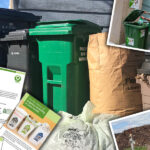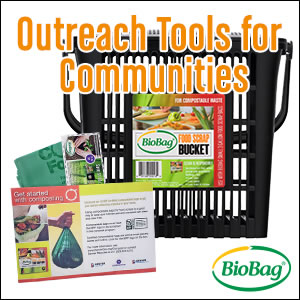
AgRecycle provides collection services to businesses and institutions in the Pittsburgh region. Photos courtesy of AgRecycle
Pittsburgh, Pennsylvania has designated December to be Food Matters Month, working with area businesses and institutions to highlight food waste prevention, recovery of edible food, and recycling the rest. AgRecycle, Pennsylvania’s longest operating composting company that has been managing the Pittsburgh region’s food scraps since 1998, is participating in Food Matters Month by posting a fact a day on its website, from December 1 until December 31, on the topic of Food Waste Awareness. Carla Castagnero, president of AgRecycle, writes that her company “is proud to be the second tier choice for handling food that is not consumed. All food that remains safely edible should be diverted to feed those in need when possible, as the first choice across this state and this country. Composting and anaerobic digestion, not landfilling, are the most environmentally responsible choices for all food that is not able to be consumed safely and for inedible food scraps.”
The first few days of December were dedicated to awareness of how much food is actually wasted. On December 7, the facts shifted to providing some ways to “rethink things that may help us all to do better and to become less wasteful with small changes.” Among those changes:
- Evaluate whether you are really better off buying in bulk vs. opting for a smaller bag at a slightly higher price. “People often fail to realize that by throwing out those last three gnarly wizened potatoes or the moldy lemons that you end up costing yourself more money than if you had purchased a smaller quantity at a higher price per pound,” explains the fact posted on Dec. 7.
- Reduce your plate size. AgRecycle cites data from Denmark — if you reduce the size of the plate from which you are eating by just 9%, food waste is reduced by 25%.
- The fact on Dec. 10 applies to dining in at restaurants. “If you are presented with an entrée that is larger than you know that you can eat, ask for your ‘doggy bag’ before you begin to eat and section out your take home portion first. This has more benefits than you might imagine. It gives you an extra meal or portion of a meal without additional cost, prevents overeating and reduces the restaurant’s cost to compost (because hopefully you support restaurants who respect the environment and do not landfill food scraps).”
The last day before writing this BioCycle Brief was Dec. 12. Not only was there an great photo of Castagnero’s Lagotto Romanglo, appropriately named James Beard, there was the following post: “As the Steeler game is not being played until 8:00 p.m. tonight, we hope you can take the time to watch a video by the truly extraordinary chef Jacque Pepin and his non wasteful use of food ingredients.”














